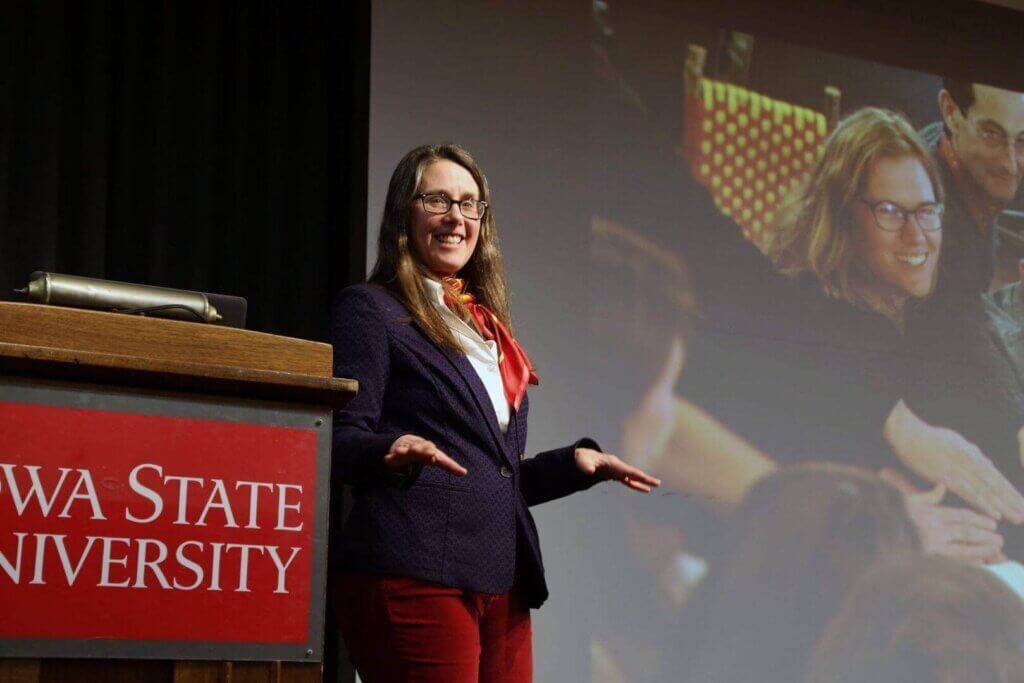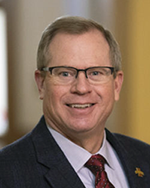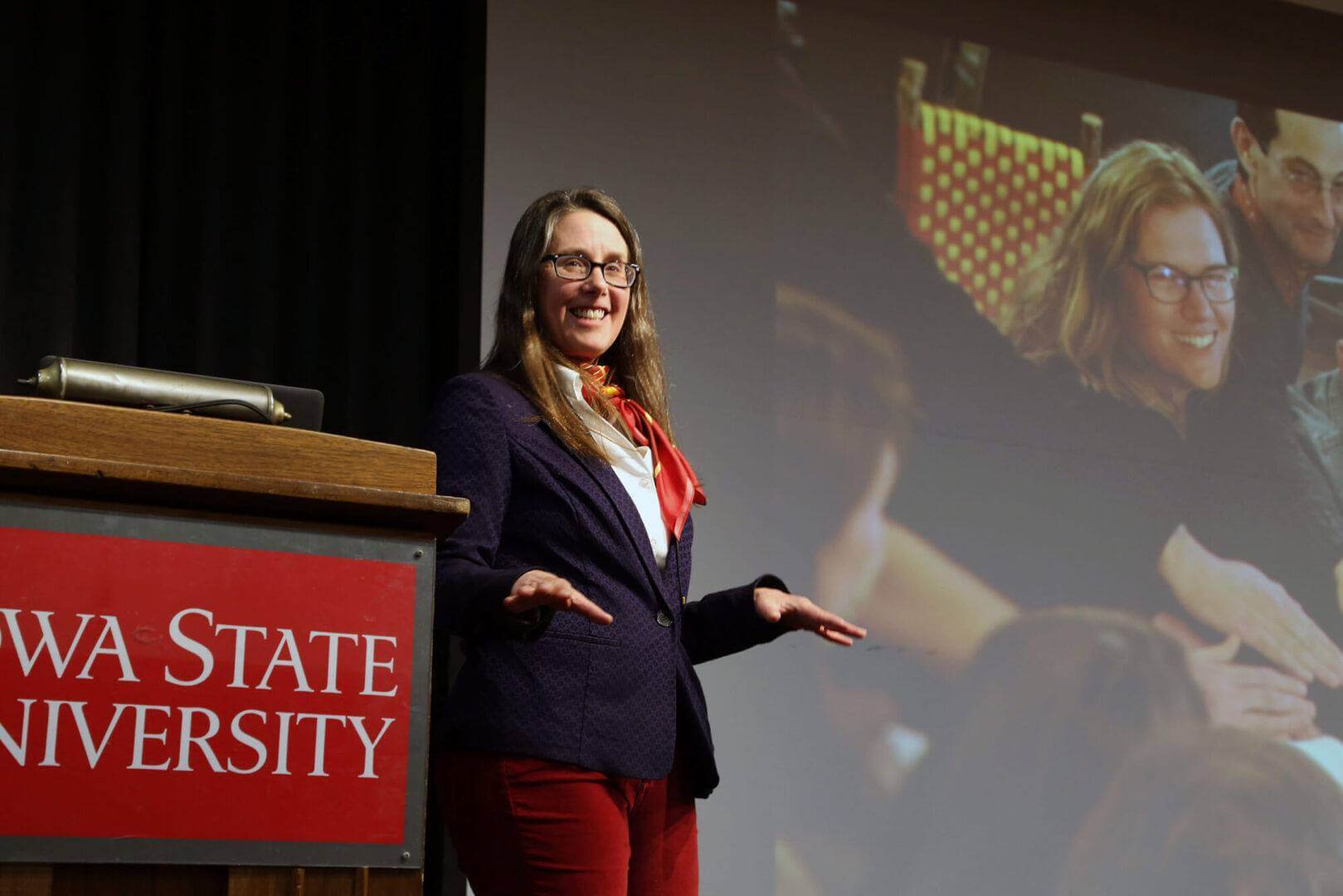Campus Faculty and Staff Share Insights, Ideas at Iowa State Research Day 2022
Posted Apr 27, 2022

For the first time since March 2019, the Iowa State University research community convened in person to collaborate, exchange ideas, and celebrate the university’s research success at Research Day 2022 at the Memorial Union on Wednesday, March 30, 2022.
Vice President for Research Peter Dorhout welcomed attendees and kicked off the day by sharing the more complex and nuanced back story of the seemingly overnight success of mRNA-based vaccines that have greatly lessened the global impact of COVID-19.

The developmental roots of today’s successful COVID vaccines, Dorhout said, trace all the way back to the influenza pandemic of 1918, when Oswald Avery began tracking a pathogen that he felt was responsible for the outbreak. While ultimately proven wrong, his dogged approach to understanding why some bacteria were deadly and others were not ultimately led to the 1944 discovery of DNA – the fundamental building block of life. Nearly 20 years later, scientists identified the connections between the code of DNA and cellular function of a “messenger” ribonucleic acid, or mRNA. The function of mRNA and its chemical composition became known then, but the important role and its application in ending another pandemic would take another 60 years and hundreds of researchers and teams to be realized.
The fundamental research that resulted in the discovery and an ever-increasing understanding of mRNA through the years ushered in an extended period of applied science and research. It took 30 years of trial and error, but ultimately Moderna, Pfizer, and others created an effective weapon in the battle against COVID.
“So much of this story is like our own,” Dorhout told the audience. “At Iowa State, we are fortunate to have an environment where a broad spectrum of research is embraced and shared . . . We have been successful at creating incredible teams of people who lean into problems and get it done.”
President Wendy Wintersteen followed Dorhout and reinforced that Iowa State truly is a “research powerhouse.”
“In the most current NSF HERD (National Science Foundation Higher Education Research and Development) survey, Iowa State was ranked 16th in research expenditures among 500 universities that do not have a medical school. That’s a big deal,” Wintersteen emphasized. “If this is not the moment in time for society to realize how important investments in research are, then I don’t know when it will be.
“As an institution, we need to continue to push for more federal support for research,” she added. “We have a great foundation of success that we can lean on every year. That’s reflected in our current year-to-date federal research funding being up 30% (compared to FY21), so kudos to you for pushing forward in the face of very real challenges.”
Research Day Reimagined
Research Day 2022 was a bit different than previous events. This year’s was on faculty peer-to-peer learning, leveraging the insights of some of the university’s most successful Presidential Interdisciplinary Research Initiative (PIRI) recipients to foster collaboration and exploration of the attributes and qualities that align with interdisciplinary research success.
A focal point of the day’s program was the opening keynote address from Lisa Schulte Moore and a PIRI panel discussion that featured Paul Plummer, Kimberly Zarecor and Hridesh Rajan.

Schulte Moore, a professor in the Department of Natural Resource Ecology and co-director of the Bioeconomy Institute, is also the director of the Consortium for Cultivating Human and Naturally reGenerative Enterprises (C-CHANGE), founded as part of a PIRI awarded in 2018.
In her address, Schulte Moore shared her perspectives on bringing together a diverse PIRI team, managing it for success and then transitioning it toward post-PIRI collaboration to develop creative and impactful solutions to significant real-world challenges.
For faculty peers interested in pursuing a PIRI, Schulte Moore offered the advice of focusing on a big idea that directly connects with at least one Iowa State Research Grand Challenge.
“As researchers, I firmly believe we are all driven to make real impacts on significant challenges,” she said. “Personally, the big challenge that drives me is the question of how do we provide sustenance for a growing human world while maintaining a livable planet? Finding a research challenge like this – one that truly compels you and extends far beyond what one research lab, or even one discipline, can address – is a good fit for the PIRI program.”
The challenges and pressures of feeding a growing population while protecting the Earth are so great, Schulte Moore said, that the idea of sustainable isn’t good enough. “We have to regenerate vital Earth resources and processes that have been diminished.”
C-CHANGE grew out of the STRIPS (Science-based Trials of Rowcrops Integrated with Prairie Strips) program, which is quantifying how prairie strips regenerate biological communities and soil health within agriculture. Schulte Moore characterized STRIPS as an important “Field of Dreams” moment.
“If you build it, people will come,” she explained. “We built the idea, the research infrastructure, and outreach program, and as we built it, researchers who wanted to be involved came along to work on the effort. It wasn’t just Iowa State faculty, staff, and students, it was also outside researchers, governmental and NGO funding partners and industry partners . . . I’m so grateful that all these people came together to work on an initiative that’s bigger than any one individual.”
Schulte Moore closed her comments by urging her Iowa State research colleagues to adhere to the three Ps: planning, patience, and perseverance.
“Our work really is a marathon and not a sprint,” she said, “and in a marathon it’s really important to celebrate each and every mile. You can’t get to mile 26 without reaching and celebrating your mile one, two, three or four achievements.”
PIRI Panelist Insights
Three additional PIRI recipients participated in a panel discussion, sharing their key learnings about collaboration, breaking down disciplinary silos, building highly successful teams and creating a high-impact research emphasis that reflects Iowa State’s cutting-edge research and attracts large external funding opportunities. Here is a sampling of their advice and key observations.
Hridesh Rajan
Kingland Professor
Chair, Department of Computer Science
2016 PIRI recipient, whose project focused on creating data-science infrastructures for improving data analysis
- “Focus on a core body of work that can serve as the basis of interdisciplinary efforts . . . Always consider what you would bring to the table in an interdisciplinary team.”
- “Find opportunities to observe other team-building activities. In my case it was experience with the Iowa State Plant Sciences Institute and the Harvard Data Science Initiative.”
- “Find a mentor who can help you succeed with a large initiative. Being able to bounce ideas off a mentor that you respect and trust is very helpful.”
- “Be intentional about creating opportunities to bring researchers and potential collaborators together; coffees and lunches are a small investment that deliver an outsized return on investment.”
- “Even for larger collaborations, having a small group of core faculty that are committed to the project is often critical to its success.”
- “Provide support to handle logistical details – e.g. event planning and management.”
- “Time and planning . . . and a lot of both.”
Kimberly Zarecor
Professor
Architecture
2021 PIRI recipient and co-principal investigator on TechTHRIVE: A Technological Vision for Thriving Rural Communities in an Innovation Economy
- “The team behind the TechTHRIVE PIRI took a little different approach in our proposal than most PIRI teams. We presented a novel argument to Iowa State leadership about how to evaluate our success if selected. We stated that the goals set forth do not equate the success of TechTHRIVE with a single large center or institute grant. While this may be a future result, the team is choosing in the short term to pursue a series of multi-million-dollar proposal submissions as well as small, more focused projects. This multi-faceted approach has a higher probability of success than a single pursuit and will encourage new convergent research in varied units across campus, which can further multiply the benefits of the PIRI investment.”
- “TechTHRIVE’s core team includes three center directors and several highly productive researchers from different parts of campus. We see PIRI funding as a platform to mentor and encourage early-career colleagues and advanced graduate students to join interdisciplinary and team-based projects.”
- “Collectively, our goal is to activate a distributed network that can help initiate efforts at many scales . . . The team’s leaders know that sometimes small dollar grants can leave very large footprints in terms of career development, personal connections and impact of the work.”
Paul Plummer
Professor
Anderson Chair of Veterinary Science
2018 PIRI recipient and director of the National Institute of Antimicrobial Resistance Research and Education (NIAMRRE)
- “Focus on creating a diverse team – outside of your core discipline – and then leverage the varied expertise of that team to look for new creative solutions to challenges and pursue high-risk, high-reward opportunities.”
- “Collaborate. Bring people together and give everyone a forum to share their work, their opinions and their ideas. When people begin to learn about each other and their work, that’s when you see the light bulbs go on and you hear comments like ‘I didn’t know anything about that field and now I see how it has an impact on my field.’”
- “Consider non-traditional methods for pursuing funding opportunities. For instance, we have leveraged our team’s expertise by taking folks to D.C. to meet directly with key federal funding agencies.”
- “Be focused and patient and be willing to take small bites to ultimately get the bigger win.”
Research Day 2022 attendees were invited to dive deeper into a wide range of topics that relate to interdisciplinary research success in a series of breakout sessions that followed the PIRI panel discussion. Then, to help facilitate cross-disciplinary collaboration, 11 invited faculty members shared brief overviews of their research and scholarly works in a Lightning Talks session. The presenters and topics were:
- Sotirios Archontoulis, associate professor, Agronomy: “Maize Production and Sustainability.”
- Nell Gabiam, associate professor, Anthropology and Political Science: “Global (Im)mobility and Disciplinary Borders.”
- William Dilla, Charles B. Handy Union Pacific Professor, Accounting: “Management Control for Sustainability Towards Integrated Systems.”
- Adina Howe, associate professor, Agricultural and Biosystems Engineering: “Adina v1.0: Engaging and Pursuing Interdisciplinary Research.”
- Cassandra “Cass” Dorius, associate professor, Human Development and Family Studies; and Heather Rouse, associate professor, Human Development and Family Studies and director, Iowa’s Integrated Data System for Decision Making (I2D2): “Integrating People and Data to Advance Collaborative Decision-Making.”
- Daejin Kim, assistant professor, Interior Design: “Revitalizing an Older Community for Successful Aging in Place.”
- Daniel Linhares, associate professor, Veterinary Diagnostic and Production Animal Medicine: “The Swine Disease Reporting System: Past, Present and Future.”
- Adarsh Krishnamurthy, associate professor, Mechanical Engineering: “Machine-Learning-Accelerated Digital Twins for Cybermanufacturing.”
- Alison Phillips, associate professor, Psychology: “Working with Community Partners to Optimize Public Health.”
- Kimberly Zarecor, professor, Architecture: “The Future of Rural Communities.”
The Research Day Steering Committee offers it sincere thanks and appreciation to all presenters and Resource Fair participants who graciously invested their time and energy to contribute to the success of Research Day 2022.

